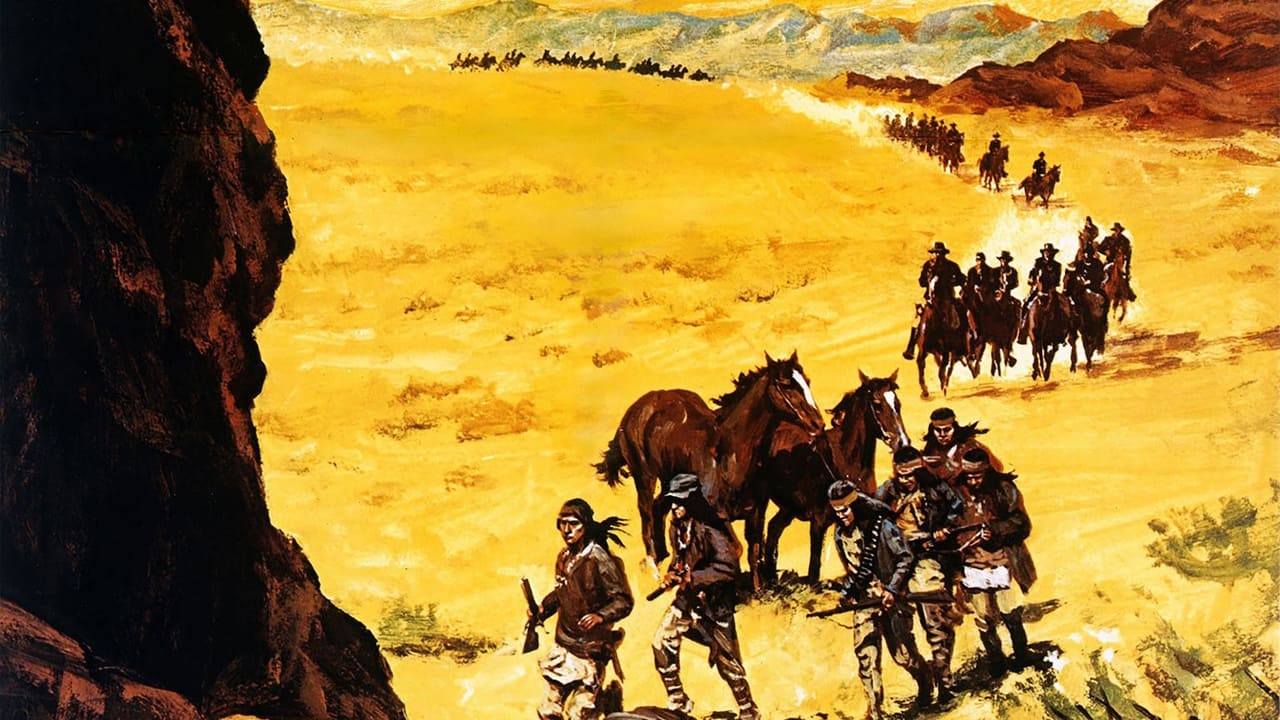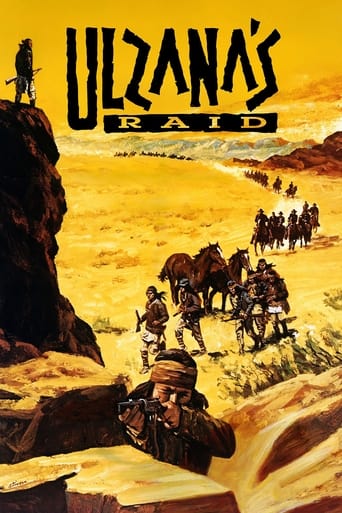

How sad is this?
... View MoreClever and entertaining enough to recommend even to members of the 1%
... View MoreJust intense enough to provide a much-needed diversion, just lightweight enough to make you forget about it soon after it’s over. It’s not exactly “good,” per se, but it does what it sets out to do in terms of putting us on edge, which makes it … successful?
... View MoreMostly, the movie is committed to the value of a good time.
... View MorePretty much up until the extreme political and social upheavals of the 1960s, whenever Hollywood wanted to deal with Native American issues, it did so with extreme prejudice, particularly in any Western in which the U.S. Cavalry, usually led by the ultimate patriot John Wayne, saw it as their mission to rid the plains, deserts, and mountains of the virgin West of what it saw as "savages" in the name of Manifest Destiny, and the name of God.But the actual history is quite a bit different from the way we had gotten around to looking at it. One such film that did a lot to right, as opposed to merely "rewrite", that history was ULZANA'S RAID.This 1972 Western film from legendary director Robert Aldrich (THE DIRTY DOZEN; FLIGHT OF THE PHOENIX) is set in the 1880s in the territory of Arizona and New Mexico. A vengeful Apache named Ulzana (Joaquin Martinez) has jumped the designated San Carlos Indian Reservation, having become understandably inflamed by the mistreatment of his people by the U.S. Army, and is now on his own violent spree along the border. Assigned to track and hunt him down is one Lt. Garnett DeBuin, a fairly inexperienced officer only six months removed from West Point well played with the right amount of naivete and curiosity by Bruce Davidson, and with a detachment aided by the Apache scout Ke-Ni-Tay (Jorge Luke) and an extremely experienced White scout named MacIntosh, more than ably portrayed by Burt Lancaster. But in their long struggle to track down and apprehend Martinez and his band of rampaging Apache, a lot of atrocities are committed. Davidson is at a loss to describe how he feels about what the Apache are doing to the new inhabitants of the land, including the hideous scene of a farm family (led by Karl Swenson) who are victims of the rampage, even though this land was Apache territory first and foremost. And when Davidson asks Lancaster's scout why he doesn't hate the Apache so much as tries to empathize with them, Lancaster's reply is so direct and to the point: "It would be like hating the desert just because there ain't any water in it." Like quite a few Westerns from the mid-1960s on, ULZANA'S RAID is a very complex film on the nature not of, say, White Men and Red Men so much as that of Man, period—the good; the bad; and, too often, the ugly as well. Given the time it was made, it was very easy to read this as an allegory for the Vietnam War, although Aldrich and screenwriter Alan Sharp (NIGHT MOVES; THE HIRED HAND) don't make it so in a flashing neon sign sort of way. If there's any film that ULZANA'S RAID resembles, it would probably be director Sam Peckinpah's 1965 Civil War-era Western MAJOR DUNDEE, which also dealt with a punitive hunt of a rampaging Apache by a rag-tag regiment of U.S. cavalry soldiers, though in that case the titular character played by Charlton Heston was obsessed with his own glory, whereas here Davidson's flaw is merely being naïve. In both cases, however, people do get killed in prodigious numbers, sometimes quite needlessly.Aldrich doesn't shy away from the atrocities on either side; even by the standards of 21st century filmmaking, there is a fair amount of violence and bloodshed, some of it hard to stomach. It is, however, a violence of a qualitative nature far removed from, say, Quentin Tarantino and closer to (though without the slow-mot or montage editing) that of Peckinpah, who had always been a fan of Aldrich's work. Davidson, who made a memorable debut in the 1972 horror film WILLARD, does a very good job in his role as DeBuin; and Lancaster, unsurprisingly, gives a solid performance as MacIntosh. Richard Jaeckel, who had been in THE DIRTY DOZEN, manages a good turn as well as a cynical sergeant; and Martinez conveys a scary power to his role as Ulzana.Shot largely on locations in Nevada and southern Arizona, and with veteran cinematographer Joseph Biroc's superb depiction of the parched landscape, ULZANA'S RAID remains one of the most unsettling and subversive Westerns ever made of any era, particularly its own; and while the violence is likely to unnerve and perhaps still repel a few people, the very nature of the story makes it a hugely insightful film even to this day.
... View MoreUlzana's Raid was released in that most downbeat of hippie years - 1972 and is a western that captures the zeitgeist of the early-'70s so well. Bleak and lacking metaphysical colour but directed with flair by Aldrich the narrative involves a breakout from a wretched reservation by a group of Apache braves. A US cavalry brigade led by but wet-behind-the-ears Lieutenant Garnett DeBuinn (young blond Bruce Davison) and scouts MacIntosh (Burt Lancaster) and Ki-Ne-Tay (Mexican actor Jorge Luke) set out to track the Apaches and encounter the spectacular but bleak Arizona-Mexican landscape. The Apaches are not depicted as noble savages and parallels with Vietnam are clear to see. London's Time Out Film Guide refer to this western as being: 'extraordinarily intelligent'. Some of the props are very interesting: for example the late 19th-Century framed military pictures in Major Cartwright's headquarters and a sort of mahogany welsh-dresser/pigeon-hole in the background which suggests a kind of synthesis. What about the tome and blue and white Dutch ceramic saucer in Willy Rukeyser's hut?
... View MoreI finally got to watch this movie last night thanks to Netflix. It wasn't what I was expecting. Made in 1972 I expected some type of simplistic left-wing hand-wringing allegory about the Vietnam War and the inherent evil of European culture vs. the Noble Red Man. Something along the same lines as the awful "Soldier Blue" (1970) or the better, but still hopelessly biased "Little Big Man" (1970). However I didn't get that at all."Ulzana's Raid" doesn't candy-coat either side. There is no simplistic paint strokes applied. The Apache Wars in the southwest in the late 1800's were brutal. No quarter was given and none was expected. Both sides were certain that they were right and their opponent was wrong and both sides were motivated by the belief that they were superior in terms of their civilizations and racial beliefs. Both sides committed atrocities, both sides could be both vicious and brave, both sides had blood on their hands.The one thing that I came away with was that the fighting in Arizona was a guerrilla war. An undeclared war that was vicious and cruel and which the movie conveys very well. If there is any allegory to Vietnam I would say that is it. War is horrific and fighting one isn't a pleasant task. Decisions have to be made that often result in death, but those decisions have to be made and people have to follow the orders of those who make those decisions. Both sides. Well done film. At times unpleasant and disturbing, but also thoughtful, intelligently written and balanced.
... View MoreAlan Sharp was the author of arguably the finest of Scottish post war novels - A Green Tree in Geddes (1965). Westerns (paperback novels mostly) were a very popular medium for young Scottish males in the 1960s and Sharp references them in his early books.Like many before him he was lured by Hollywood and unfortunately got only two books into the trilogy that began with 'A Green Tree'.Ulzana's Raid has some Scottish references - the Glasgow or Dundee 'hard men' of Sharp's youth would have been familiar characters in the Western milieu - hard drink rough fighting men.It's possibly a great film, as A Green Tree in Geddes was very nearly a great book.
... View More